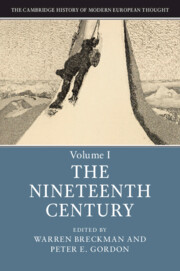Book contents
- The Cambridge History of Modern European Thought
- The Cambridge History of Modern European Thought
- The Cambridge History of Modern European Thought
- Copyright page
- Contents
- Contributors
- Preface
- Introduction
- 1 German Idealism: The Thought of Modernity
- 2 European Romanticism: Ambivalent Responses to the Sense of a New Epoch
- 3 History, Tradition, and Skepticism: The Patterns of Nineteenth-Century Theology
- 4 The Young Hegelians: Philosophy as Critical Praxis
- 5 Utilitarianism, God, and Moral Obligation from Locke to Sidgwick
- 6 Capital, Class, and Empire: Nineteenth-Century Political Economy and Its Imaginary
- 7 Positivism in European Intellectual, Political, and Religious Life
- 8 European Liberalism in the Nineteenth Century
- 9 European Socialism from the 1790s to the 1890s
- 10 Conservatism: The Utility of History and the Case against Rationalist Radicalism
- 11 The Woman Question: Liberal and Socialist Critiques of the Status of Women
- 12 Darwinism and Social Darwinism
- 13 Historicism from Ranke to Nietzsche
- 14 Philology, Language, and the Constitution of Meaning and Human Communities
- 15 Decadence and the “Second Modernity”
- 16 Nihilism, Pessimism, and the Conditions of Modernity
- 17 Civilization, Culture, and Race: Anthropology in the Nineteenth Century
- 18 The Varieties of Nationalist Thought
- 19 Ideas of Empire: Civilization, Race, and Global Hierarchy
- 20 Rethinking Revolution: Radicalism at the End of the Long Nineteenth Century
- Index
4 - The Young Hegelians: Philosophy as Critical Praxis
Published online by Cambridge University Press: 15 August 2019
- The Cambridge History of Modern European Thought
- The Cambridge History of Modern European Thought
- The Cambridge History of Modern European Thought
- Copyright page
- Contents
- Contributors
- Preface
- Introduction
- 1 German Idealism: The Thought of Modernity
- 2 European Romanticism: Ambivalent Responses to the Sense of a New Epoch
- 3 History, Tradition, and Skepticism: The Patterns of Nineteenth-Century Theology
- 4 The Young Hegelians: Philosophy as Critical Praxis
- 5 Utilitarianism, God, and Moral Obligation from Locke to Sidgwick
- 6 Capital, Class, and Empire: Nineteenth-Century Political Economy and Its Imaginary
- 7 Positivism in European Intellectual, Political, and Religious Life
- 8 European Liberalism in the Nineteenth Century
- 9 European Socialism from the 1790s to the 1890s
- 10 Conservatism: The Utility of History and the Case against Rationalist Radicalism
- 11 The Woman Question: Liberal and Socialist Critiques of the Status of Women
- 12 Darwinism and Social Darwinism
- 13 Historicism from Ranke to Nietzsche
- 14 Philology, Language, and the Constitution of Meaning and Human Communities
- 15 Decadence and the “Second Modernity”
- 16 Nihilism, Pessimism, and the Conditions of Modernity
- 17 Civilization, Culture, and Race: Anthropology in the Nineteenth Century
- 18 The Varieties of Nationalist Thought
- 19 Ideas of Empire: Civilization, Race, and Global Hierarchy
- 20 Rethinking Revolution: Radicalism at the End of the Long Nineteenth Century
- Index
Summary
In 1837, David Friedrich Strauss intervened in the enormous controversy that had raged around his book The Life of Jesus, Critically Examined since its appearance in 1835. The book was indeed provocative. Not only did Strauss deny the divinity of Jesus Christ as the incarnate son of God. He even left in doubt that Jesus, the man, had actually existed in history. The book shook the Hegelian School to its core, and, surveying the fractures that had emerged, Strauss identified a ‘left’, ‘right,’ and ‘center.’ The crucial dividing line rested on a matter of great concern to Hegel and his followers, namely the relationship between philosophy and Christian doctrine. “There are three possible answers to the question of whether and to what extent the idea of the unity of divine and human nature proved the gospel to be history,” wrote Strauss: “the concept proves either the entirety of the history, merely a part of it, or none of it. If each of these answers and directions were indeed represented by a branch of the Hegelian school, then, using the traditional analogy, the first direction, as standing closest to the long-established system, could be named the right, the third direction named the left, and the second named the center.” On the left, he placed only himself. That situation did not long endure. The radicalization of the Hegelian left proceeded so rapidly that, by 1841, Strauss had broken his ties with the Deutsche Jahrbücher, the main journal of the Hegelian left, no longer able to tolerate the criticisms and gibes of other leading figures such as Arnold Ruge, Ludwig Feuerbach, and Bruno Bauer.
- Type
- Chapter
- Information
- The Cambridge History of Modern European Thought , pp. 88 - 110Publisher: Cambridge University PressPrint publication year: 2019



